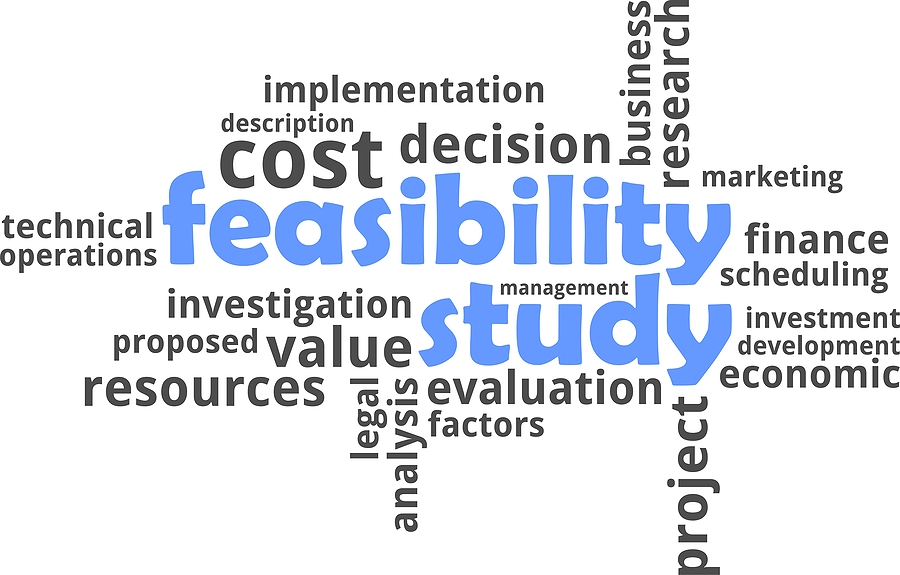A feasibility study is an analysis that is designed to reveal whether a project or plan is feasible or not. It is the study of the applicability of a proposed project or plan.
A feasibility study considers all the relevant factors of a project; these include — technical, legal, economic, and scheduling considerations.
A feasibility study is a profitability check performed before the commencement of a project. It is carried out to ascertain whether a project’s execution costs are worth the utilities and services it provides.
A feasibility study provides an overview of the primary issues that affect a business idea. It aims to identify any “make or break” issues that might jeopardize your business’s success in the marketplace.
Put simply; a feasibility study determines whether a business idea makes sense or not.
A feasibility study can be any or all of the types mentioned below:
- Technical Feasibility
- Financial Feasibility
- Market Feasibility
- Organizational Feasibility
It is essential for business and government organizations to carry out a feasibility study to — effectively address where and how a project will operate, identify potential obstacles which might impede operations, and recognize the amount of funding a project will require to get up and running.
How Feasibility Studies Bring About Positive Change
Every project is first conceived as an idea, but the idea must always be tested and refined. To prevent the misuse of physical and financial resources, it is important to assess whether the factors surrounding the project are viable or not.
Below are the advantages of carrying out such studies:
- A clear-cut idea of whether the project is going to be successful before allocating the budget, manpower, & time.
- Enhanced efficiency & focus of the project team.
- Streamlining of business alternatives
- Prevents mishaps and mitigates risks
- Valuable insights for the team and the stakeholders of the project.
There are numerous other profound benefits of conducting a feasibility study for a project plan:
Feasibility Studies Show the Viability of Your Vision
Some business ideas appear to be invincible on paper yet never come to fruition due to execution roadblocks encountered along the way. Such unrealised projects cost organisations priceless time and capital until it is a bit too late.
By evaluating the landscape that surrounds your vision, who your customers are & how you will gain them, and gauging the competition, you will be able to ascertain the likelihood of your success.
Feasibility Studies Help Define Your Goals and Objectives
An idea is great, but it is only as great as its execution. A feasibility study provides you with an action plan with benchmarks that ensure a project’s viability.
By listing out potential hurdles, setting necessary benchmarks and learning from the competition’s mistakes, you can chart out a plan that increases the likelihood of you achieving your definition of success.
For example, your aim might be to develop an indoor/outdoor sports facility, but you may not have an immediate idea of the construction costs for the same. A feasibility study provides you with a clear picture of the facility’s costs and its revenue earning potential.
Powered by this information, you can either obtain the resources to complete the project or ‘resize’ it to the ‘right size’ based on the already available resources.
Feasibility Studies Help You Devise a Plan
Like ideas, goals can be realised only after the necessary work is done. By defining your goals with the help of a feasibility study, you will better understand the next steps in your development cycle. The work is now easier to carry out with a set of clear, well-defined tasks which can be assigned to different teams for completion. Charting out such a plan now allows you to formulate a program plan for a ‘right-sized’ facility; combining this with a financial forecast and an economic impact study will help you attract the right funding partners.
Feasibility Study Gives You Your Client’s Identity
When you plan a new sports, entertainment or recreation facility, you only have a general idea of who you want to target. However, to attract a worthwhile audience, you need to identify the client demands as well as what the competition is offering. A feasibility study will help you understand what you lack and what your prospective customers appreciate the most. Once all of this is revealed, a feasibility study starts to shape your identity by making you take the necessary steps to take on an ideal service provider’s role in your niche.
How To Conduct An Ideal Feasibility Study
A feasibility study necessarily evaluates a project’s potential for success; therefore, perceived objectivity is the most crucial factor while studying potential investors and lending institutions.
Therefore, a feasibility study must be conducted with an objective, unbiased approach to provide legitimate information upon which decisions can be made.
Experts believe that a well-conducted feasibility study should also take into consideration the historical background of a business or project — description of the product or service, accounting statements, details of the operations and management, marketing research and policies, financial data, legal requirements and tax obligations, etc.
The Following Skills Are Essential For Conducting A Good Feasibility Study
- Environmental Analytical Skills
- Market Analysis Skills
- Technical Analysis Skills
- Economic Analysis Skills &
- Financial Analysis Skills
The importance of Feasibility Studies for business projects should never be overlooked. They lead to gigantic cost & time savings, provide clarity along every step of execution, convinces potential investors and helps you target the right clients and customers.
Image Source: BigStockPhoto.com (Licensed)
Site Disclaimer
The Content in this post and on this site is for informational and entertainment purposes only. You should not construe any such information or other material as legal, tax, investment, financial, or other advice. Nothing contained on our Site constitutes a solicitation, recommendation, endorsement, or offer by HII or any third party service provider to buy or sell any securities or other financial instruments.
Nothing in this post or on this site constitutes professional and/or financial advice. You alone assume the sole responsibility of evaluating the merits and risks associated with the use of any information or other content in this post or on this site.
You recognize that when making investments, an investor may get back less than the amount invested. Information on past performance, where given, is not necessarily a guide to future performance.
Related Categories: Work, Reviews







